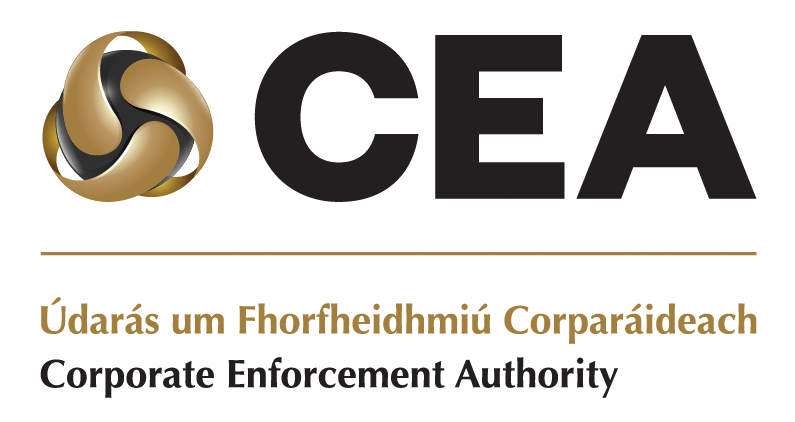The graduated response of the Corporate Enforcement Authority (CEA)

There are over 300,000 companies registered in Ireland. Companies are governed by the Companies Act 2014, an enormous piece of legislation which contains 1,648 sections.
In these sections, there are close to 400 specific criminal offences, known as category offences, ranging from minor category 4 (Class A fine) to the most serious category 1 (where a conviction on indictment can result in a term of imprisonment of up to 10 years or a fine of up to €500,000 or both).
There is also a range of civil enforcement measures which are available under the 2014 Act. For example, directors of companies can be restricted or even disqualified from acting as a director of any company. Companies can be compelled to produce documents if there is an offence suspected, or they may be involuntarily struck off the register of companies.
The Companies Act 2014 is one of the largest pieces of legislation on the Irish statute books. The question arises – how are breaches of company law policed?
The enforcer
The CEA is an independent statutory body in Ireland responsible for enforcing any breach of the Companies Act 2014. It operates under a graduated and proportionate response framework, which means it takes a flexible approach to enforcement actions, tailoring them to the seriousness of the act of non-compliance.
The graduated enforcement policy allows the CEA to take an appropriate response to breaches of company law. Persistent offenders may face more stringent enforcement measures than a less serious offence or a first-time offence. This approach ensures that the CEA’s resources are used effectively and that appropriate penalties are imposed.
The CEA’s directorates include Criminal Enforcement, Civil Enforcement, Legal, Legal and Policy, Finance and ICT, Digital Investigations and Analytics, Governance and Support Operations, and Insolvency Supervision. Members of An Garda Síochána are seconded to the CEA, where they work with digital forensic experts, accountants and in-house legal counsel.
The CEA’s graduated enforcement response
For some breaches of company law, the CEA can resort to administrative measures. These include:
1. Warning letters: A formal warning letter is sent to the company or individual outlining the specific non-compliance and the potential consequences of continued non-compliance. This serves as a clear message that the CEA is aware of the issue and expects it to be rectified.
2. Statutory direction: In cases where non-compliance persists, the CEA may issue a statutory direction, formally requiring the company or individual to take specific actions (for example, call an annual general meeting of a company). Failure to comply with a statutory direction can lead to further enforcement action.
For other breaches, the CEA may resort to civil enforcement actions. These include:
1. Disqualification orders: The CEA can apply to the courts to disqualify directors from holding office for a specified period, usually around five years. This is a serious sanction that can be imposed for misconduct such as fraud in relation to the company, or a serious breach of someone’s duty in their position as officer of the company. Disqualification for five years (or such shorter or longer period as a Court may order) is automatic if someone is convicted on indictment for any offence under the Companies Act.
2. Compliance orders: The CEA has the power to apply to a court to direct a company to remedy a default within a certain amount of time. The court may order that the company responsible for the default should pay for all costs of the application.
In the most serious cases of non-compliance, the CEA may send files to the Director of Public Prosecutions (DPP) for potential criminal prosecution on indictment. This can result in large fines, imprisonment, or both. The CEA also has the power to bring summary prosecutions in its own name for more minor criminal offences. These prosecutions take place in the District Court.
How the policy works in practice
In one recent case, the CEA’s Insolvency Supervision Directorate dealt with a liquidator who had not submitted a report regarding the conduct of directors of an insolvent company.
When a company becomes insolvent and is unable to pay its debts as they fall due, the law requires the liquidator (who is responsible for winding up the company) to submit a report regarding the behaviour of the company’s directors to the CEA after six months from when the liquidator is appointed.
In this case, the liquidator had failed to submit a statutory report in respect of not one, but six insolvent companies. The liquidator initially promised to deliver those reports, but after a year, no report had yet been received. Further, the liquidator then stopped responding to any correspondence from the CEA.
It is a criminal offence for a liquidator not to deliver these reports to the CEA, one which attracts a maximum six-month imprisonment and a Class A fine, or both.
However, the CEA assessed this case’s specific circumstances and deemed that civil enforcement was appropriate and succeeded in bringing High Court proceedings against the liquidator to compel him to deliver the outstanding statutory reports within a specified timeframe. Legal costs were awarded to the CEA.
The impact
The CEA’s statutory mandate is not only to enforce the law by using a wide array of tools available to it, but to publicly promote compliance with the law. The organisation’s response strategy achieves value-for-money and allows an organisation the equivalent of a medium-sized company to enforce the behaviour of thousands of corporate entities.
For further information:
E: info@cea.gov.ie
W: cea.gov.ie






